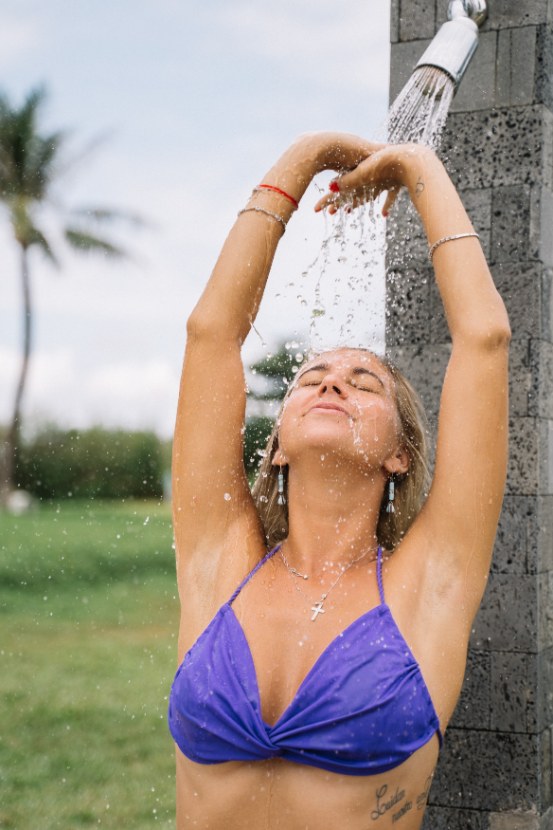Not always having access to a hot shower when you need one is one of the few drawbacks of camping. In a truck bed camper, it can be difficult to take a shower while you’re camping or traveling, especially if you have a family. Thankfully, there are a few quick and environmentally friendly ways to stay clean during a lengthy camping trip. You can learn how to take a shower while camping if you read this article.
Why Showering While Camping Is Important
Although taking daily showers while camping is uncommon, it is ideal to take just enough of a shower to get rid of extra dirt and oils. Showers help you feel more refreshed and get a better night’s sleep by removing bad skin bacteria, preventing acne, and removing odors.
Daily showers are typically regarded as a healthy habit, even though you might not need to take a shower every day, especially if you are not perspiring or engaging in physical activity.
To maintain proper hygiene, you should at the very least rinse off with fresh water every few days. In order to shower and improve your camping experience, you’ll need to use a different technique if freshwater is not available (more on these techniques later in this post).
How To Shower When Camping
Book A Campsite With Showers
Of course, booking a spot at a campsite with showers is the simplest option. They do exist but don’t expect a spa-like experience. Showers at campgrounds are typically simple but offer some privacy in the form of individual cubicles, similar to those at a gym, and are accessible to visitors on a pay-per-use basis.
You’ll frequently have a time limit, so you’ll want to be ready. You must bring your own towel, soap, and shower shoes, as well as any other necessary toiletries.
Use Truck Stop Showers
When traveling by car, you can avoid the lengthy wait in the shower line at the campsite by making a pit stop at a service station or gas station. Although they may sound a little frightening, these are typically quite tidy and well-kept.
Although you’ll need to bring your own soap, shampoo, and towel, they may even have a hairdryer. Shower shoes are also strongly advised.
Bag Showers
These are typical, as the name implies, water-filled bags that can be heated by the sun. Solar-heated showers use a material that absorbs heat from the sun and typically has a hose and nozzle for water flow.
A bag shower needs to be hung from a tree or hook high enough for gravity to push the water through the showerhead. After use, these showers can be easily packed away and can hold up to 5 gallons of water.
Bring Your Own Portable Camping Shower
Portable camping showers come in a variety of sizes, from extremely basic pocket-sized devices to free-standing ones, but they all basically consist of a bag that you fill with water, typically heated by the sun, and a hose and spray.
If you’re using soap, choose a location that is at least 200 feet away from any bodies of water, hang your bar from a tree, and let the sun warm the water throughout the day. When you return from your adventures, rinse off.
Take A Sponge Bath
The good old-fashioned sponge bath is basic, but still, a great option and all you need is a good camping bucket, a sponge, and some soap and water. Locate a quiet area that is at least 200 feet away from any bodies of water, far enough away from other campers to be out of sight.
If the bucket is large enough, you can stand inside it and splash some water on your underarms, crotch, and other ripe areas. Use a small amount of soap, then wipe it off with a sponge. When you’re done, pour the remaining water over your head for a quick shower.

Use A Lake Or River
If there is a safe body of water nearby, such as a lake or river, and the water isn’t too icy or has a weak current, you can just take a quick dip to wash off some of the day’s grime. You might want to bring a pair of the best water shoes if the bottom is slick or rocky.
Of course, avoid using shampoo or soap as these items will harm the local fish and other wildlife. If the water is nice, take your time and enjoy some wild swimming.
Use Wet Wipes
Okay, so it’s not a shower or even a bath, but the simplest solution—and one of the best for backpackers—is to pack a packet of wet wipes and only use them to clean a small area when the odor gets out of hand.
Brands like REI sell all sorts of wipes(opens in new tab) meant for staying clean in the wild, and these are pretty lightweight and packable. Just remember to bag the wipes when you’re finished, and take your trash outside with you after you’re done.
On-the-go Clean With A Showerpouch
A complete shower setup on-site isn’t always feasible or necessary. With a good wet wipe, you can still practice excellent hygiene while you’re out and about. The ShowerPouch, which offers extra-large body wipes that are quickly hygienic and odor-free, is one of our favorites.
After using your ShowerPouch wipe, you can either rinse it off and reuse it later or put it in the washing machine at home. Additionally, they are biodegradable.
Pick one of three mild scents and keep it in your daypack for when you start to notice that you smell a little funny. For outdoor adventurers, the ShowerPouch is a must-have because it is organic, functional, and antibacterial.
Tank Showers
Tank showers typically require little to no setup, are portable, come with hoses or pumps, and can be heated with batteries. When not in use, they take up more space in storage but are so simple to use and useful for many camping needs.
Electric And Gas-powered Camp Showers
Use an electric or gas-powered appliance instead of boiling water if you don’t want to wait for the sun to warm it up.
A HOTTAP and your propane tank can be used to make your own portable hot water heater. Try a battery-operated camp shower like the Geyser if you enjoy your showers being extremely hot.
These are also essentials for camping trips in the winter when a cold shower isn’t what you want. These camping showers can be found for anywhere between $300 and $500 on the market.
How To Save Water While Showering
Although it is always a good idea to use as little water as possible when showering, this is not an option if you are camping. There are several ways to conserve as much freshwater as you can.
Take A Sponge Bath
Since sponge baths use the least amount of water, they are popular when camping. To “wipe” off grimy skin, wet a sponge or washcloth with water and a small amount of biodegradable soap. Once you feel clean, rinse the sponge or cloth and continue wiping several times.
Avoid Washing Hair
If at all possible, try to avoid washing your hair because it always uses a lot of water. If washing your hair is necessary, concentrate on washing your scalp first and let the biodegradable soapy water flow down your body for “double duty.” If you can’t give up the conditioner, try using a leave-in conditioner to avoid having to rinse your hair again.
Rinse Off Method
Since it uses the most water and may require frequent refills, the rinse-off method is ideal for campgrounds with water spigots. With this technique, you’re supposed to spray water on your body, turn off the faucet, wash with soap, and then rinse.
Read More: How To Store Camping Chairs





